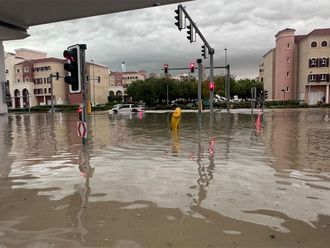Abu Dhabi: The UAE’s ambitious Mars Hope Mission remains on track for launch next year according to a senior Nasa official who spoke with the media on Wednesday on the sidelines of the Global Space Congress in Abu Dhabi.
“I believe there’s a really good chance that the UAE will make it. Everything I hear from our US partners and from partners and colleagues here [in the UAE] is that this mission is on track for 2020,” said Thomas H. Zurbuchen, associate administrator, Science Mission Directorate at Nasa.
Zurbuchen highlighted how Nasa has been in close contact with the UAE in terms of providing the country with the technical support needed for having a successful mission.
“The agreement that we have with them is to provide technical support, so we actually have an advisory group [working together],” Zurbuchen explained, noting that several experts from Nasa’s jet propulsion laboratory are part of the group.
“The biggest number of successful missions [to Mars] comes from the jet propulsion laboratory so the experts are there providing technical support,” he added.
“The systems that we use to communicate with our Mars missions will also be made available to ensure support for that mission — getting the data [back] to earth,” Zurbuchen said, noting how Nasa’s deep space communications would be made available to the UAE.
Zurbuchen also emphasised the major challenge in the Mars mission, but said that it was a challenge worth taking due to its immense benefits.
“Of course going to mars is hard, close to 50 per cent of all Mars missions have failed, so everybody knows this is really difficult.
“The reason Mars is so important is that it has the promise in many ways to be an outpost for humanity on Earth in a way that no other site can be. We know Mars has resources such as water; it has other resources in the crust that have the promise of sustaining life — our life if we’re there,” he added.
Zurbuchen also said that the similarities between the red planet and Earth made it an ideal site for scientific research and studies.
“Three billion years ago, Mars looked a lot more similar to Earth than any other planet. Mars used to have an ocean — only 150 metres deep — it used to have a magnetic field we believe, it used to have an atmosphere and so it looked a lot similar to Earth during a time when life on Earth started emerging.
“So we’re really interested in learning whether there are such patterns of early complex chemistry or perhaps even life, [and] so it’s one of the most exciting places to research,” he added, highlighting the potential breakthrough scientific discoveries that have yet to be made.
Zurbuchen said that humans reaching Mars would eventually lead to even further explorations to deeper parts of space.
“Over time scales of 20-100 years I hope we learn how to go to other stars, we don’t know how to do that, the first step is to learn how to go to other planets.”












